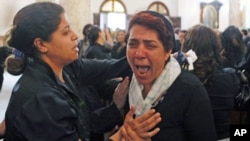Tensions between Christians and Muslims in Egypt have boiled over into sporadic violence for many years, but the dramatic changes in the country have brought the issue once again to the fore.
Eye for eye
The murder of a parish priest proved the most recent tipping point here. Anba Daoud Boutros was found stabbed to death in February in his home just outside Assyut. At his funeral a few days later, angry mourners spied a young man at the edge of the graveyard, his beard a sign of his Muslim faith.
Magdy Maher, a Coptic Christian who was at the burial, describes what happened next.
Maher says that the some of the mourners turned on the Muslim youth and began to beat him. Maher said he tried to intervene, but the man was badly hurt. Tensions quickly escalated. Copts held protest marches. Muslims denounced the beating. Insults turned to threats. Within days, investigators alleged the murder was planned by the priest's Christian maid and the motive was robbery. But by then, it didn't matter. A group of young Muslim men took up arms. That's when Wael Mohamed Saleh, of the Islamist group Gamaa Islamiyah, got involved.
Saleh says he and others managed to convince the avenging group that punishing all Copts for the mistakes of a few is unjust and goes against the tenets of Islam. He notes some of the young men involved weren't even particularly religious, just angry, but he credits God for "the tranquility in the hearts" of those trying to calm the situation.
Diffusing the conflict
Among those working to diffuse the anger were Christian elders. And the joint effort worked. Three months later, some of the interfaith "wise men" gather at a cafe overlooking one of Assyut's main canals and reflect on the incident: what it says about religion, human nature and the state of modern Egypt.
Over glasses of mango juice, the men all say they have friendships across religious lines. They stress what they say is the usual ease of relations between the two groups. Friction, they argue, was often the work of the previous government, playing one side off the other.
Some point out that in Egypt, where the people for the most part share a common ethnicity, religion is one of the few obvious points of difference to exploit.
Still, there are underlying complaints. Copts, who make up about 10 percent of Egypt's population, have said they feel oppressed by the majority Muslims. Muslims counter that Copts can be "provocative."
Businessman Saleh, of Gamaa Islamiyah says Muslim youth don't always understand that others don't recognize the prophet Mohammed. Saleh councils that "if that's your belief, keep it in your heart but don't speak about it," because that, he says, causes hatred.
The conversation veers toward how people of any faith can become victims of blind anger, and how quickly things spiral out of control. Mohamed Bahaa, a computer engineer and member of the conservative Muslim Salafi sect, says pious Muslims and Christians bear the burden to solve the problems.
Bahaa recalls that when anger looked ready to turn to violence after the priest's murder, he was on the scene within half an hour.
The importance of speed has prompted others to replicate the model that formed in the wake of the killing.
Working together
Muslim and Christian leaders have worked together to set up smaller versions of their interfaith crisis group in towns and villages across Assyut governate. Gamil Ashm Alla is a retired army general who works closely with the leaders of his Coptic church and several Islamic movements.
Alla says these mini-committees are notified the moment trouble starts to brew. The faster the mediators arrive, he says, the fewer people get involved, making the situation much easier to resolve.
Crowds have a momentum of their own. Other elders stress the need for mediation has become greater in recent months.
Security forces disappeared after the uprising in January and have yet to fully re-establish control. Economic concerns -- from the cost of bread to problems in the supply of home cooking fuel -- are only likely to add to uncertainty, suspicion and division. The elders realize they have their work cut out for them.





